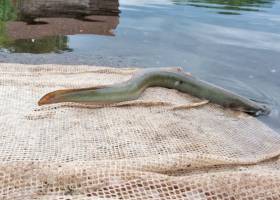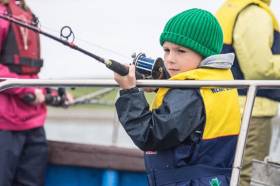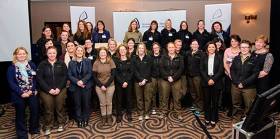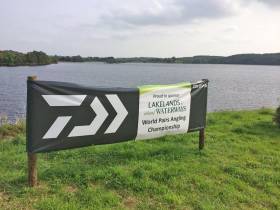Displaying items by tag: IFI
Eel Fishermen Celebrated By IFI For Scientific Contributions
#Fishing - Local eel fishermen were celebrated recently at an information day hosted by Inland Fisheries Ireland in Athlone.
The fishermen, who are involved in IFI’s Scientific Eel Fisheries in different parts of the country, attended the event which aimed to provide an update on the progress made through these fisheries and to recognise the contribution of the fishermen to date.
In total, there are 11 fishermen involved in the initiative, with many experienced in fishing for eels over several years.
Since last year, they have provided support to IFI by fishing for eel in a conservation-focused manner with a view to gathering necessary data which will help protect the species into the future.
Their local expertise and historical knowledge around eels in their areaa has given invaluable support to IFI during the set up and delivery of the Scientific Eel Fishery.
IFI commenced the process of setting up a network of scientific fisheries for eel around Ireland in 2016. These scientific fisheries cover the different life stages — glass eel, elver, yellow and silver eel — and are distributed in key catchments around Ireland.
The purpose of the fisheries is to increase the knowledge around eels in Ireland ahead of the next EU review of this endangered species, and to inform the management of eel populations which are currently in decline.
Dr Cathal Gallagher, head of R&D at IFI, said: “This important partnership between eel fishermen and research has one shared objective: to improve our knowledge of the state of the eel populations and to ensure their conservation for future generations.
“Inland Fisheries Ireland appreciates the benefit of citizen science programmes such as this one which will preserve the heritage of eel fishing and at the same time deliver on the research requirements needed to report to the EU. I would like to recognise and thank all the fishermen involved for their support.”
Citizen science is growing in popularity and encompasses many different ways in which citizens who are non-scientists are involved in scientific research projects.
The involvement of fishermen in the Scientific Eel Fisheries plays an important role in respecting the tradition and heritage of eel fishing in Ireland. Many of the fishermen come from families where eel fishing has been practised across several generations with local expertise and knowledge passed down through the years.
#Angling - A total of 79 angling initiatives — almost double the number of recipients in 2016 — will be supported to the tune of €30,000 in Inland Fisheries Ireland’s (IFI) 2017 Sponsorship Scheme.
This year’s recipients were decided with a focus on those which help grow Ireland’s angling tourism product and support novice anglers:
- 19 international angling events which will be held in Ireland.
- 15 Irish angling teams travelling overseas to international angling events.
- 28 coaching/juvenile events aimed at novice and young anglers.
- 16 national angling events held in Ireland for domestic participants.
- 1 seminar which will help the exchange of information, ideas and practical experiences on fisheries management.
The angling groups, located in 19 counties across the country, will be supported through financial aid and where possible, through resource support from IFI staff.
The sponsorship scheme was announced in December with applications invited from anglers, angling clubs and organisations nationwide. In total, there were over 100 applications to this year’s fund.
Suzanne Campion, IFI head of business development, said: “We have a unique opportunity in Ireland when it comes to angling as a result of our beautiful landscapes and wild fish populations. This is coupled with a large number of engaged angling groups across the country.
“We are committed to supporting those groups in helping to increase participation in angling and to position Ireland as a premier national and international angling destination. This will grow the recreational availability and contribution of angling to communities across Ireland and will also support businesses and jobs in rural communities.”
IFI’s National Strategy for Angling Development aims to increase overseas angling visits from 163,000 in 2015 to 173,000 and increase domestic participation of 273,000 anglers annually by 0.5%.
Angling in Ireland is currently worth €836 million to Ireland’s economy annually, supporting upwards of 11,000 jobs. If increase in participation is realised, angling could bring in an additional €53 million annually and support 18,000 jobs.
Find more more information on the initiatives awarded funding under the 2017 sponsorship scheme HERE.
Fishery Offence Summonses Halted Pending Amended Legislation
#Angling - Legal actions against poaching and other illegal angling and fisheries activity have hit a stumbling block after it was found that Inland Fisheries Ireland (IFI) does not have “explicit power to prosecute offences”.
The Department of Communications, Climate Action and Environment has called a halt to any summonses currently before the courts until necessary amendments to the Fisheries Acts are enacted.
IFI says it is considering whether fresh summonses can be issued at a later stage when the amendments are in place. In the meantime, any alleged offenders remain liable to prosecution.
Inland Fisheries Ireland Recruiting Temporary Research Staff
#Jobs - Inland Fisheries Ireland’s R&D division has secured external funding to undertake a series of research projects, which are currently seeking to recruit a number of staff as research technicians and fisheries assistants.
Interviews will take place in mid to late March to fill a number of positions for periods of up to a maximum of 10 months’ duration during 2017, and a panel for subsequent positions will be compiled following interview.
All positions will be based at the current IFI head office in Dublin’s Citywest Business Campus.
Research Technician
The appointee will provide technical support to the Senior Research Officer (SRO) and project team in the compilation and analysis of data of relevant biotic and abiotic information for fish species in Irish lakes, rivers or estuaries, using standard fish sampling methodologies.
Principal duties and responsibilities include:
- Data collection: Carry out and lead field surveys when necessary, collect data on the abundance, composition and age structure of fish populations from designated waterbodies, collect data on the distribution, biology and ecology of fish species in designated waterbodies.
- Data analysis: Collate and input data into project databases and present data in report format as required, data mining, conduct statistical analyses (descriptive and analytical) of data sets, including using relevant statistical software, manage fisheries datasets for the project, assure quality of data including editing and verification of consistency, create tables, charts and graphics with narrative text, interpret data, analyse and prepare reports.
- Reporting: Maintain raw data and all other records in a clear concise format and compile and maintain all records in a manner compatible with GIS.
- Other duties: Liaise with the project team and stakeholders and attend/contribute to information meetings as required, liaise with other IFI staff working on related projects as required.
Requirements for this position include a relevant diploma or degree or equivalent, and a full driving licence valid in the State. Salary is at the first point of the technician scale (as at 1 January 2016): €32,231 to €51,717 (including 1 LSI).
Fisheries Assistant
The appointee or appointees will assist the Senior Research officer and team in the compilation and analysis of relevant biotic and abiotic information for fish species in Irish lakes, rivers or estuaries, using standard fish sampling methodologies.
The successful candidate or candidates will be expected to:
- Assist on field surveys (if necessary).
- Undertake processing of sample material and providing assistance to the SRO with sample analysis.
- Assist in the processing of fish samples, collate scale, otolith and opercular bone samples to provide information on age profile and growth rates of fish species, and input data into IFI databases.
- Maintain raw data and all other records in a clear concise format.
- Compile and maintain all records in a manner compatible with GIS.
- Liaise with other IFI staff working on related projects as required.
Requirements for this position include a Leaving Certificate or equivalent with minimum Grade C on at least two Higher Level papers, to include one of Biology, Chemistry, Physics, Geography or Maths, and a full driving licence valid in the State. Salary is at the first point of the fisheries officer/fisheries assistant scale (as at 1 January 16): €22,907 to €36,235 (including 2 LSI’s).
Applications, (a cover letter and up-to-date CV) should be sent to [email protected] by 5pm on Friday 3 March. Please quote either ‘Fish’ for Fisheries Assistant roles or ‘Tech’ for the Technician role,s depending on which you wish to apply for. Late applications will not be processed.
Short listing will be based on information provide in the cover letter and CV. Canvassing will disqualify. Inland Fisheries Ireland is an equal opportunities employer. All enquiries to [email protected].
IFI Stands Up For Women & Girls In Science
#MarineScience – Women at Inland Fisheries Ireland who work across science projects are celebrating International Day of Women and Girls in Science today (11 February 2017).
International Day of Women and Girls in Science is a UN initiative which aims to help achieve full and equal access to and participation in science for women and girls.
Staff working in IFI carry out scientific fisheries research, monitoring and investigations which aim to manage, improve and protect the inland fisheries resource.
Find out more about International Day of Women and Girls in Science here.
IFI Recruiting Fisheries Officers For 2017 Season
#Jobs - Inland Fisheries Ireland (IFI) is currently seeking to recruit a number of staff as fishery officers nationally for periods of up to six months during 2017.
Fisheries officers will be primarily concerned with the implementation and enforcement of the provision of the Fisheries Acts, Water Pollution Acts and other relevant statutory provisions. They are required to:
- Provide, in co-operation with other fisheries staff, comprehensive conservation and protection services, inland and at sea, within any part of a fisheries district and/or any other area assigned within one or more fisheries districts.
- Provide, in co-operation with other fisheries staff, comprehensive improvement, and development and fisheries management support services within any part of a fisheries district and/or any other area assigned within one or more fisheries districts.
A number of positions will be concerned with assisting either directly or indirectly in fisheries related research projects. The full job specification is available HERE. Please note a full driving licence valid in the State is required.
Applications (a cover letter and up-to-date CV) should be emailed to [email protected] by 5pm on Monday 27 February quoting ‘HR/FO/2017’. Late applications will not be processed. All enquiries to [email protected]
Salary will be at the first point of the Fishery Officer Scale (as of 1 January 2016) plus an unsocial hours allowance, which will be paid at either 50% or 100% relative to the number of unsocial hours worked.
IFI is an equal opportunities employer. Canvassing will disqualify.
IFI Outlines Efforts In Protecting Ireland’s Inland Fisheries Resource
#Angling - Inland Fisheries Ireland (IFI) spent 188,404 staff hours and carried out 31,180 patrols in 2016 to protect Ireland’s fisheries resource, it was announced yesterday (Wednesday 25 January) at the launch of the IFI Protection Review.
The review highlights the results of recent protection work of the nation’s fisheries resource, which contributes €836 million annually to the Irish economy.
IFI’s programme saw fisheries officers patrol the entire resource – which includes 74,000km of rivers and streams, 128,000 hectares of lakes and 5,500km of coastline – in their attempts to apprehend those responsible for illegal fishing or angling and environmental offences.
Some key findings from the Fisheries Protection 2016 Review include:
- 103 prosecution cases initiated for breaches of fisheries and environmental legislation, regarded as one of the most important tools in the prevention of illegal fishing activities in the long term.
- 1,487 items of illegal fishing equipment seized, including 301 illegal fishing nets which measured 14,782 metres in total – about the same distance from Leinster House to Dublin Airport.
- 22,066 environmental inspections across a variety of sites including farms, industrial premises, wastewater plants, forestry sites and wind farms as well general inspections for pollutants in the natural habitat. Inspections were carried out by environmental officers with a view to mitigating against potential environmental incidents which could have a detrimental impact on fish populations and fish habitats.
- 36,979 inspections of recreational anglers carried out nationwide to ensure anglers were compliant with the fisheries acts, which aim to protect fish populations.
Minister of State for Inland Fisheries Sean Kyne, who opened IFI’s Oireachtas Briefing Day event yesterday, said: “Close to 200,000 man hours speaks for itself but I want to commend Inland Fisheries Ireland for the immense and dedicated efforts they have put into protecting our invaluable inland fisheries resource.
“The vast array of river, lake and coastal based habitats present huge logistical challenges for our frontline protection staff and for Inland Fisheries Ireland management. These challenges are being met by augmenting traditional patrol and protection methods with state-of-the-art surveillance technologies and new and innovative patrol methods in the ever changing environment in which services are delivered.”
IFI chief executive Dr Ciaran Byrne added: “The role of Inland Fisheries Ireland is to act as steward of the inland fisheries resource and that role is crucial as we endeavour to protect and conserve Ireland’s aquatic habitat and the wild, indigenous fish populations who live within it.
“Our fisheries and environmental officers worked relentlessly in 2016 to ensure the continued availability of this resource to communities nationwide for recreational and business opportunities.
“The resource contributes €836 million to the Irish economy every year and in particular, it supports rural and peripheral communities through tourism opportunities which may not be there otherwise. Our National Strategy for Angling Development outlines how we can grow the economic contribution by an additional €96 million per year and our protection programme goes hand in hand in helping us realise those ambitions.”
The fisheries protection programme comprised planned day and night patrols, covert patrols and intelligence-led surveillance operations, and specifically targeted the fish species most at risk during particular seasons.
The principle methods used for patrols were boats (1,151 patrols), kayaks (188 patrols) and personal water craft (37 patrols) while land-based patrols were carried out using quad bikes (84 patrols), bicycles (363 patrols) and by vehicles and foot (29,357 patrols).
In addition to the use of traditional methods, fisheries officers used advanced surveillance equipment including night vision scopes, thermal imaging scopes and enhanced optical surveillance scopes to help them in their work.
IFI’s National Strategy for Angling Development is the first national framework for the development of Ireland’s angling resource. The strategy will deliver a wide-ranging set of investments, innovations and promotions to ensure that fish stocks and angling infrastructure are protected and enhanced and will see an investment of €25 million over the next five years to grow the socio-economic contribution of angling in Ireland.
Last year, over €1 million was invested by IFI in angling development projects alone, which included 50 angling access projects as part of the Capital Grants Fund plus ongoing investment in more than 4,000 angling structures.
Cork Brothers Convicted Of Illegal Salmon Fishing
#Angling - Two Cork brothers have been convicted of stroke hauling a salmon last August in breach of Section 170 (1) of the 1959 Fisheries Act last August.
At a sitting of Clonakilty District Court on 3 January, Judge David Waters imposed fines of €750 and costs of €500 each on Niall and Lawrence Fitzpatrick over the incident at Goose Pond on the Argideen River in Co Cork on 1 August 2016.
The charges had been vigorously contested by the brothers, but Judge Waters convicted the men and remarked upon the “unwarranted and unfounded allegations” made against Inland Fisheries Ireland’s fisheries officers who gave evidence in court.
The brothers had accused the fisheries officers of lying to the court, claiming that they had caught the salmon by fly fishing and that the fish had “swallowed the hook”.
After hearing evidence from the fisheries officers in regard to marks on the fish, Judge Waters was satisfied that the fish had in fact been stroke hauled, a mechanism by which a weighted instrument or device is used to foul-hook the fish.
Sean Long, director of the South West River Basin District, said following the verdict: “Ireland’s wild indigenous fish populations must be protected and conserved for future generations. This is an extremely valuable resource which makes a significant economic contribution to the local economy through angling tourism.
“This court case sends a clear message that illegal fishing activity will not be tolerated in Cork. Our fisheries officers are committed to protecting this resource for the public through overt and covert surveillance operations and we will continue to hold those who carry out illegal activity, which damages our resource, accountable.”
Mayo Man Convicted Over Illegal Angling Incident At Cloongee Fishery
#Angling - A Mayo man has been convicted of obstructing a fisheries officer and failing to produce a salmon licence over an incident on the River Moy.
At a sitting of Castlebar District Court on 3 January, Judge Mary Devins imposed fines totalling €600 on David Egan of Claremorris.
Inland Fisheries Ireland (IFI) brought the case against Egan when he was found fishing a section of the Cloongee Fishery on the River Moy in the Pollagh area and was not in possession of a valid permit or salmon angling licence.
Solicitor Dermot Hewson, acting on behalf of IFI, outlined the facts of the case against Egan and his refusal to hand over his fishing gear. No defence was offered by Egan, who pleaded guilty to both charges.
IFI’s ownership of the fishing rights on the Pollagh section of the Cloongee Fishery, near Foxford, was disputed previously but was confirmed at a special sitting of Castlebar Circuit Court in 2012.
The fishery was purchased from the private owners by the former North Western Regional Fisheries Board on behalf of the State in 2005.
IFI chief executive Dr Ciaran Byrne said: “The regulation of angling on the River Moy is imperative if we are to effectively conserve and protect this valuable resource.
“Incidents of obstruction of Fisheries Officers have become quite common and this court case sends a clear message that this will not be tolerated.
Dr Byrne added that the Cloongee Fishery “is well known as a very productive salmon fishery and Inland Fisheries Ireland has ensured that permits are available locally at a reasonable cost. The fisheries resource offers huge value from both a recreational and economic perspective to the local community.
“Inland Fisheries Ireland will continue to apprehend those who carry out illegal fishing activity.”
Leitrim Angling Project Shares In Rural Waterways Stimulus Package
#Angling - Following the announcement of an €800,000 stimulus package for economic development on Ireland’s waterways, Inland Fisheries Ireland (IFI) has released details of Leitrim’s share to develop angling in Ballinamore.
An award of €100,000 from the Department of Arts, Heritage, Regional, Rural and Gaeltacht Affairs under the REDZ (Rural Economic Development Zone) Initiative will go to improving access to angling in Ballinamore with a view to developing tourism in the Lakelands region, as proposed by Leitrim County Council with support from IFI.
The project involves the development of angling infrastructure at Garadice and Kiltybarden Lakes, venues noted for match angling and currently annual hosts of the World Pairs Angling Championships. The €100,000 grant will upgrade the facilities at these locations to draw other national and international competitions to the area.
The angling facility will also be accessible to wheelchair users and will have a special area dedicated to youth angling.
In total the project will cost around €125,000, with the rest of the funding provided by IFI (€21,200) and Leitrim County Council (€3,800).
Frank Curran, chief executive of Leitrim County Council, said: “We are delighted with the approval of the funding for the Rural Economic Development Zone for Ballinamore and Carrigallen area which is focusing on the angling sector.
“Angling is an extremely important economic driver for this area made possible by the excellent fishing lakes in the locality along with a well-known, international reputation. Ballinamore/Carrigallen has been host to numerous angling competitions such as the World Pairs and the Dutch King of Clubs.
“Leitrim County Council looks forward to working with the local trade and Inland Fisheries Ireland in the delivery of this project in the coming months.”
IFI head of business development Suzanne Campion added: “Our fisheries resource is precious from a recreational and economic viewpoint. We are committed to ensuring that Ireland uses the resource to its best potential in a conservation focused manner and we are delighted to secure this funding for Leitrim.
“Anglers already enjoy the great fishing and beautiful scenery available at Ballinamore and this facility will make access to angling easier and allow the area to cater for several large and international angling competitions.
“Investment in angling development is crucial if we are to help attract visitors to rural areas. We know that angling visitors spend considerable time in an area when they identify with it as an angling destination. Anglers use several services and business in an area when visiting such as accommodation, restaurants, shops as well as boat hire and equipment rental.
“We look forward to working with our partners, Leitrim County Council and the community, in enhancing Ballinamore as a top angling destination.”
The Ballinamore project will form part of IFI’s National Strategy for Angling Development (NSAD), a comprehensive national framework for the development of Ireland’s angling resource.
The strategy aims to deliver a wide-ranging set of investments, innovations and promotions over the coming five years, to ensure that Ireland’s fish stocks and angling infrastructure are protected and enhanced for both their economic value and recreational benefit to the communities and visitors they serve across Ireland.







































































